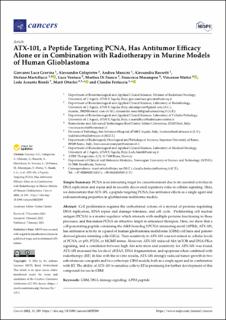ATX-101, a Peptide Targeting PCNA, Has Antitumor Efficacy Alone or in Combination with Radiotherapy in Murine Models of Human Glioblastoma
Gravina, Giovanni Luca; Colapietro, Alessandro; Andrea, Mancini; Rossetti, Alessandra; Martelucci, Stefano; Ventura, Luca; Di Franco, Martina; Marampon, Francesco; Mattei, Vinvenzo; Biordi, Leda Assunta; Otterlei, Marit; Festuccia, Claudio
Peer reviewed, Journal article
Published version
Permanent lenke
https://hdl.handle.net/11250/3047190Utgivelsesdato
2022Metadata
Vis full innførselSamlinger
Originalversjon
10.3390/cancers14020289Sammendrag
Cell proliferation requires the orchestrated actions of a myriad of proteins regulating DNA replication, DNA repair and damage tolerance, and cell cycle. Proliferating cell nuclear antigen (PCNA) is a master regulator which interacts with multiple proteins functioning in these processes, and this makes PCNA an attractive target in anticancer therapies. Here, we show that a cell-penetrating peptide containing the AlkB homolog 2 PCNA-interacting motif (APIM), ATX-101, has antitumor activity in a panel of human glioblastoma multiforme (GBM) cell lines and patient-derived glioma-initiating cells (GICs). Their sensitivity to ATX-101 was not related to cellular levels of PCNA, or p53, PTEN, or MGMT status. However, ATX-101 reduced Akt/mTOR and DNA-PKcs signaling, and a correlation between high Akt activation and sensitivity for ATX-101 was found. ATX-101 increased the levels of γH2AX, DNA fragmentation, and apoptosis when combined with radiotherapy (RT). In line with the in vitro results, ATX-101 strongly reduced tumor growth in two subcutaneous xenografts and two orthotopic GBM models, both as a single agent and in combination with RT. The ability of ATX-101 to sensitize cells to RT is promising for further development of this compound for use in GBM.

